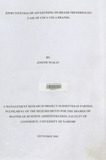| dc.description.abstract | Kotler, (2000) has identified advertising as a key strategy in the acquisition and retention of
customers. He further states that customer retention is cheaper than customer acquisition. Jefkins
(1992) argues that advertising is very important in the marketing of a product. Advertising is a
controversial subject about which people tend to form strong and often contradicting opinions
(Batra et al, 1995).
This study was' conducted with an objective of fmding out the effectiveness of advertising on
brand preference, the case of Coca-Cola brands among the Coca-Cola drinkers in Nairobi.
To achieve the above objective, primary data was collected from a sample of 50 respondents, out
of whom 44 responded successfully leading to a response rate of 88% which was considered
sufficient enough to achieve the intended objective. The sampling frame comprised of any
person taking a Coca-Cola brand in the retail outlets. 8 respondents were selected from the major
streets with high volume turn over and 5 from the smaller streets with less volume turn over.
The collected data was analysed by use of descriptive statistics. These include tables, charts and
percentages. Frequency charts were used to summarize the advertising attributes on brand
preference. .
The study found out that advertising affects brand preference, this was evident because Coke,
being the most advertised brand, came out to be the most favoured brand. The study also found
out that several factors are considered important in the effectiveness of advertising on brand
preference in the soft drink (Coca-Cola brands). Among the most important are:
(i) The benefits outlined in the advertisement
(ii) Timing of the message
(iii) Creativity of the advertisement
(iv) The ease to recall the advertisement
(v) Taste of the brand.
As recommendation, firms need to consider the above factors and test them against their soft
drink brands if they hope to win the attention of their consumers and persuade them to buy. Only
by doing so, will they remain relevant to their consumers and beat competition. | en |

